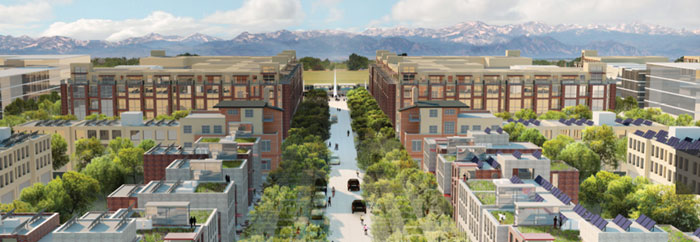by Cathy Proctor, Reporter for the Denver Business Journal. This article was originally published by the Denver Business Journal.
Find out how one futuristic Denver neighborhood is using the latest technology to target zero carbon emissions in this Denver Business Journal article from July 21, 2017.
 The Peña Station Next development near Denver International Airport already sports a solar panel-covered parking lot, a huge battery system and other smart technologies — and now it’s aiming for neutrality on carbon dioxide emissions.
The Peña Station Next development near Denver International Airport already sports a solar panel-covered parking lot, a huge battery system and other smart technologies — and now it’s aiming for neutrality on carbon dioxide emissions.
Several businesses — including Xcel Energy Inc., Panasonic Enterprise Solutions Co., developer LC Fulenwider Inc. and Denver International Airport — are joining with the National Renewable Energy Laboratory (NREL) to study how to turn the area into a “carbon-neutral energy district, they announced Friday.
The Peña Station Next development is at 61st Avenue and Peña Boulevard. LC Fulenwider is the master real estate developer for the mixed-use community which includes the North American headquarters for Panasonic Enterprise Solutions Co.
The development is being billed as a “smart city” that will integrate a variety of technologies into its transportation and operations.
Net-zero projects typically cover a building or small area and include enough renewable energy sources, such as solar power panels at the site, to offset electricity consumption from traditional fossil fuels over the course of a year.
The carbon-neutral initiative at the Next station aims higher — to leverage a wider set of technologies, including renewable energy, batteries, and potentially capturing carbon in the air, or credits for carbon capture projects elsewhere. The goal is “to fully offset the district’s climate impact due to electricity generation and consumption,” the partners said in an announcement.
Xcel is considering owning and operating the new infrastructure the development will need to achieve carbon neutrality — with an eye toward offering the test-driven technology to other Colorado communities in the future.
Panasonic, in the announcement, said its executives are interested in how the company can replicate carbon-neutral districts on a larger scale elsewhere.
NREL has the opportunity to strengthen its partnership with industry and also apply its facilities and expertise to this project as well as others.
Earlier this year, Xcel and Panasonic flipped the switch on a microgrid system that incorporated solar power and battery storage at Peña Station Next, a project done with the help of DIA and Fulenwider.
The project includes a 1.6 megawatt solar power system, with the panels shading the parking lot underneath, a 259 kilowatt rooftop solar power system on Panasonic’s headquarters building, a battery energy storage system capable of holding 2 megawatt hours of power.
The U.S. Department of Energy’s Solar Decathlon competition will be held at the station Oct. 5-15. Twelve college teams from around the world will show off houses they’ve built that rely on solar power and incorporate energy-efficient design, smart home solutions, water conservation measures, electric vehicles, and sustainable buildings.
